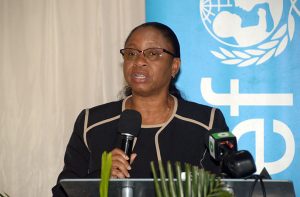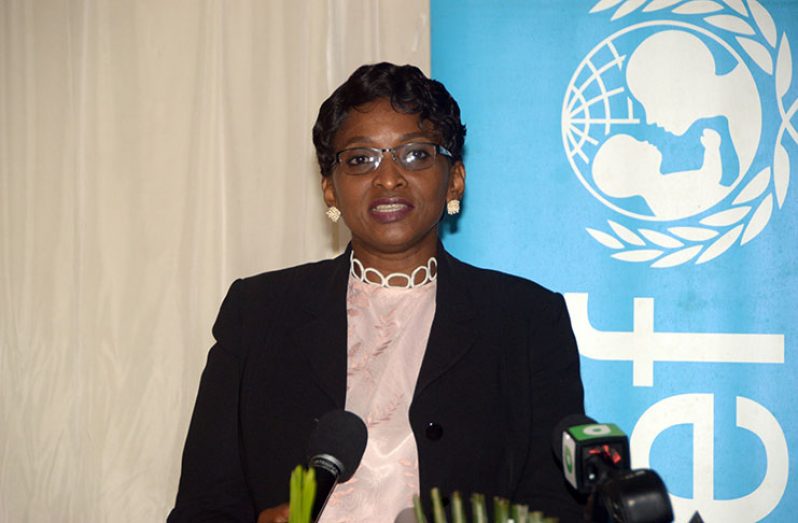MEDIA operatives can be charged for publicly broadcasting, transmitting or reporting the identity of a witness or complainant in a sexual offence case, and if found guilty, a fine of $2M will be ordered by the court.
This was disclosed by High Court Judge, Justice Joanne Barlow, during a United Nations Children’s Fund (UNICEF) media sensitisation forum on the coverage of domestic abuse and sexual offences.
The event was held on Friday at Parc Rayne, Rahaman’s Park, Houston, East Bank Demerara.
The judge noted that if the court and the police are vigilant, media operatives can be charged and placed before the court for not complying with the Sexual Offences Act 2010.
She said the media must ensure that the witnesses and complainants remain anonymous in the news reports and unnecessary graphic details ought not to be disclosed.
“Every attempt must be made to avoid unnecessary graphic details. Sometimes even when you are reporting at the beginning, not the sentencing, something happens and the first news item comes out, and the details are revolting,” the judge said.
Justice Barlow said that no victim or survivor wants the public to know of his or her trauma and terror experienced during any ordeal, to be placed in the public domain.
“You didn’t name her, or identify her, but she reads that article, and she knows that the unnecessary details concern her. Members of the media, I know sensational juicy stories sell, but at the end of the day, we have to make it easy for the witnesses, and the complainants to feel that they can come forward and tell their story, and not have to live with a stigma,” the judge said.
She explained that a sexual offence is one of the things that never die and no one wants anyone to know such has happened to them.
In giving an example, Justice Barlow said “imagine your child going to school and your daughter mashes somebody’s toes, and she goes home and tells her mother, and her mother says ‘tell she don’t mash your toe when she was small her father raped her’. If we want people to feel comfortable, to come forward and tell their story, then reporting has to be [done] in a way to assist us all in keeping as much of the details out of the public domain.”

Meanwhile, Chief Justice (ag), Roxane George said the media need to adopt guidelines for the reporting of domestic violence cases, particularly the homicide cases.
She said it is important that there is fair, accurate and sensitive reporting of sexual offences and domestic violence cases.
“These are deeply personal cases that have traumatic consequence not only for victims, but their families, especially children. And in this era where stories are online and maybe in the cloud forever, these stories can lead to longer term trauma for persons as they can be more easily retrieved and rehashed, not only by journalists, but by all and sundry whether for positive or negative reasons,” the Chief Justice said.
According to Justice George, responsible reporting is important because it raises awareness about such issues and how persons should address them.
“It gives courage to victims to report and seek assistance without the fear of sensational reporting,” Justice George noted.
The judge noted that the fear of public embarrassment and ridicule for victims is very real, and laws will have to be enabled in the future to seek in camera hearings of criminal cases that are domestic-violence related like the provisions in place for sexual offence cases.
However, during the interim, the Chief Justice said responsible reporting should be practised around; accountability, dignity, accuracy, equality, images and sensitivity to different cultures and religions.
She explained that the report should focus on the perpetrator and speculative, sensationalist and trivialising language should be avoided.
Underscoring that fatal domestic homicides are crimes of control and not crimes of passion as suggested by the media, Justice George said at the end of such stories, information on where a victim could receive help should be added.

Justice George said media guidelines are a training tool and reference point to new and upcoming journalists on best practices.
The Sexual Offences Act 2010 was enacted, placing special emphasis on women and children, who are most vulnerable, and are usually the most likely victims of sexual abuse. With this bill, all offences that are in violation of the law are clearly spelt out, as well as the penalties for such crimes.
According to the Act, a sexual offence is any sexual violation on an individual that includes rape, and any other form of sexual assault, such as touching or causing the complainant to touch a third party in a sexual way.
Also in attendance at the event were UNICEF representative to Guyana and Suriname, Sylvie Fouet; Principal Magistrate, Sherdel Isaacs-Marcus; and Professor Paloma Mohamed.



.jpg)










